Strictly Personal
Party Primaries: A Week Of Daggers And Dollars by Lasisi Olagunju
Published
2 years agoon
“My brother will give 15,000 dollars. Initially, he was working on 2,500 per delegate but when Ibrahim entered the race and offered 10,000, my brother had to jack his own up to 15,000. The delegates told him not to do anything for them again after winning the election.”
I eavesdropped and heard this statement in a public place last week in a south-west city. I had to double-check from a friend who was with me there. Did I hear right? My friend told me I did – and the guy truly had a brother contesting the senatorial primary of one of the big parties. I tried to do a quick calculation of how much $15,000 was in Nigeria. I thought that would translate to about N7 million per delegate for a senatorial primary! My friend told me my calculation was wrong. He said I used CBN rate. He reminded me that no one uses traceable FOREX from banks to do politics. Nigeria’s financial system feeds the black market which in turn feeds the dark world of elections in Nigeria. It is complex. The result is the American dollar you see up on the mountain and glowing at par with N600. My friend said the calculation I did was wrong; the answer should be N9 million per delegate.
A reporter filed a story to me last Friday. The report said the PDP in Imo State had instructed “all aspirants”, in writing, to give transport ‘stipends’ to delegates. The reporter quoted a memo dated 19th May, 2022 and signed by the state secretary of the party. It was an order complete with threats and figures: each House of Assembly aspirant must give each delegate N30,000; every House of Representatives aspirant must pay each delegate N50,000; every senatorial aspirant must shell out N80,000 to each delegate. So, how much is each delegate going home with after these primaries? Before you answer that question, please note that there could be as many as ten aspirants jostling for each of those tickets; note that every of the aspirants must obey the party’s order to pay. Note again that the delegates are definitely in their hundreds and each of them will vote to elect candidates for all the three posts. You can now do the calculations; it is democratic mathematics (or mathematical democracy). The PDP is a very creative party; it said the directive was to “minimise cost” and “conserve funds” during the primaries. If I did not sight a copy of the memo, I would not believe that anyone would document a vote-buying order. But it is true. In 2022 Nigeria, nothing is too ‘gross’ to do by anyone if it is about cash and power. Nothing is an inhibition again. There is no public opinion; the powerful own the public and its opinion.
A political system defined solely by money cannot be a democracy. The oracle of our political dictionary needs to be consulted for guidance on what we run and what it should be called. Our people, very long ago, stopped voting without being paid. If you tell delegates of this week that exchanging votes for dollars is not democracy, they will ask you what it is. They would likely ask you what you think of our ancestors who declared that unless the young eat kola nut, the elders must not be allowed to have the throne (Omodé ‘ò j›obì; àgbà ‘ò j›oyè)? The young here is the voter; the monied aspirant/candidate is the elder.
A friend›s surname is Olówóyeyè (the rich fits the throne); another is Olówólàgbà (the rich is the elder). Olówópòròkú was a popular politician in Ekiti State; his name means ‹the rich wins all arguments.› There was a man called Akinpelu Obisesan in Ibadan of the late 19th to mid-20th centuries. He was a contemporary of Ibadan›s ultra-rich Salami Agbaje and Adebisi Idiikan (1882-1938). Those rich two were the real big men in the big town while Obisesan was always in despair, always sulking and in self-pitying slough because of his relative poverty. He always compared his fate with those of those two and wondered where he chose his own head from. Obisesan kept a diary which is a valuable record of wealth and misery and debt; of how money made chiefs and how it deposed chiefs. He wrote about the meaninglessness of life without money in the world he lived. The diarist, in a moment of want and self-pity, wrote: “Nobody in this town will regard anyone of no means; he will be counted as no man…. after all, what is our intelligence, our school going, and reading of books without getting money to back these three things up?” He noted in particular that if you had money, you could jump steps on life›s social ladder and confound those who thought they were eagles with great wings, and had flown before. With money, all things are possible. He was right. On 26 November, 1926, Adebisi, ‹man of means›, ploughed into Ibadan chieftaincy, jumped 10 rungs of the ladder and was installed Ashaju (Asiwaju) Baale of Ibadan. An astonished Obisesan witnessed this and exclaimed in his diary that, truly, money “is the god of the world.” With this week›s party primaries, you will see greater wonders.
What sort of politics can money buy? American author, Jaime Lowe, asked that question in an April 6, 2022 article in the New York Times. And, it is not the only question he asked in that incisive piece. Indeed, Lowe›s article has the intriguing title: «With ‘Stealth Politics,’ Billionaires Make Sure Their Money Talks. What do they actually want?» His answer to the first question is: “It’s hard to know exactly…” And I think it fits the second question as well. Behind politicians who are buying every available delegate with every currency of worth are standing very quiet, wealthy people with various masked agenda. The ultra-rich are a dangerous riddle; they are everywhere, even when you are not seeing them. What they want is definitely not power for power›s sake. Yet, till eternity we won›t be able to answer questions on what they want and why they want it. Benjamin Page, an American political scientist cited by Lowe, provides an insight: “The main reason billionaires practise stealth politics is that taken collectively, their political preferences do not align with what a majority of the (people) want.” The mind of the super-rich, anywhere in the world, is deep and unfathomable especially where money and power are in contention. That is why I say that this week of decision in Nigeria is actually a billionaires› week. It is also a week of cloak-and-dagger negotiations. The super-rich have closed down the economy; they are mopping up every dollar available to buy delegates and choose our governors, lawmakers and president for us this week. They are locking the choices and narrowing the options down to their men. After this season of primaries, they will go back to their rocking chair and leave you, the poor, to choose from their choices and claim the credit on election day next year.
Contesting the presidency of Nigeria is an ultra-rich billionaires› sport. Two weeks ago, I had an engagement with Chief Dele Momodu, celebrity journalist and PDP presidential aspirant. It was a long discussion. We exchanged books and ideas and spoke briefly on the golden days at Great Ife. Then the journalist in him tried me. He said he was interested in my story. I smiled and changed the course. A reporter›s story hardly makes any headline. In today›s Nigeria, the aspirant is the news; and so, I launched out. Where did he get the gut, the audacity to say he wanted to be president of Nigeria? It is awesome that he paid the N40 million PDP nomination fee but that is just about one percent of what it takes to be president of Nigeria or of anywhere. He told me that he might not be a billionaire but he had enough men of means around him to put the wind behind his sail. He said he would compete and prevail over those whose only endowment and qualification for the top job is money. Besides, he added, billionaires don›t get the Nigerian presidency; they always fail to clinch the throne. I wanted to ask why he thought it was so but he didn›t wait for me to ask: You don›t hand over political power to a man who already has economic power. If we do that, we will lose our country to mindless oligarchs. That was his submission. And he cited examples. Momodu said he had paid his dues and was determined to make a statement that what others did badly, he could do well and excel there for the good of the people. I took a long look at him; I did not see a man who was joking. But is the pathway to his ambition not mired by the peculiarities of Nigeria›s presidential politics? And he is doing this not in a fringe, panting party, but right in the power house of a money-guzzling behemoth, the PDP. It takes guts and lots of cash to do that.
What I heard from Dele Momodu two weeks ago was what Dr. Kayode Fayemi of the APC told his party people in Kaduna State last Friday. “I am not a moneybag,” he said, “but I know that this job has never gone to a moneybag…” Fayemi said he had no billions, but like Momodu, he was truthful enough to let us know that he had friends big enough to keep him afloat in this game of sharks. He then challenged the people (delegates) to let the future of their children be a priority over immediate gains. We need more of such sermons from the throne. Dr Fayemi is my friend and person. But I wish I could tell him and Dele Momodu and the few other men of ideas in this contest that head or tail, the billionaire owners of Nigeria always win. They own the yam and the knife; they only use the hands of the victim victor to peel the tuber. The vultures are gathering.
The last time we voted in a presidential election, we reinforced failure. The result has been a free-fall of all values. Another election cycle has started. There is a rush to replant the old trees the old way in order to reap new results. Do we need to be told that sowing seeds of failure with an eye on harvesting fruits of success is how to know the meaning of insanity? The failure we entrenched in 2018/2019 has become a possessed Iroko; it demands daily worship from everyone, the holy and the unholy. The evil tree›s food has been blood and more blood and it won›t ever be tired unless the axe does its duty. But where is the axe? We condone evil and provide cultural contexts as excuses for misbehaviour.
Four years ago (6 August, 2018), I wrote on this page that we do with Nigeria what we don›t do with our personal lives. I said: The best should rule the rest is a cardinal order even in the animal world. And it isn’t that we don’t know what is right. We just won’t do it for Nigeria. But why? At least, we carefully choose our cooks, our drivers, the doctors who treat us; mechanics who fix our cars. We don’t accept counterfeit currencies nor do we knowingly take expired drugs. We do due diligence on that boy and that girl seeking the hand of our child in marriage. But we orphan Nigeria, we feed it poison –like talks of foisting ancestral candidates on the parties; and endorsing what may be Muslim/Muslim or Christian/Christian tickets and other toxic, suffocating stuffs. Wisdom is the pill Nigeria needs from us. But we did not inherit that from our masters, the British. Power here, at all levels, goes to the weakest, the unlettered, the unskilled, the unwise, the sick, the bigoted who is backed with real money. And so the country is crippled in the hands of deadly fake doctors serially hired to manage our case. By this time next week, the candidates will be known. And by then, we will know how clearly hopeless our situation is.
You may like
-


Air Peace, capitalism and national interest, By Dakuku Peterside
-


This is chaos, not governance, and we must stop it, By Tee Ngugi
-


Off we go again with public shows, humbug and clowning, By Jenerali Uliwengu
-


How patriarchy underpins gender violence today, By Tee Ngugi
-


Help! There’s a dangerous, secret plot to save the EAC from imminent death, By Charles Onyango-Obbo
-
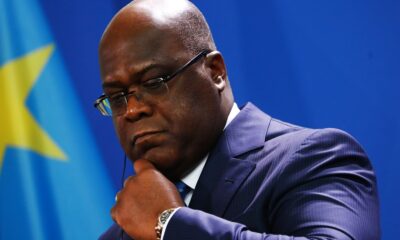

How South Africa, US elections could shape Tshisekedi’s bread in Kinshasa, By Charles Onyango-Obbo
Strictly Personal
Air Peace, capitalism and national interest, By Dakuku Peterside
Published
1 week agoon
April 16, 2024
Nigerian corporate influence and that of the West continue to collide. The rationale is straightforward: whereas corporate activity in Europe and America is part of their larger local and foreign policy engagement, privately owned enterprises in Nigeria or commercial interests are not part of Nigeria’s foreign policy ecosystem, neither is there a strong culture of government support for privately owned enterprises’ expansion locally and internationally.
The relationship between Nigerian businesses and foreign policy is important to the national interest. When backing domestic Nigerian companies to compete on a worldwide scale, the government should see it as a lever to drive foreign policy, and national strategic interest, promote trade, enhance national security considerations, and minimize distortion in the domestic market as the foreign airlines were doing, boost GDP, create employment opportunities, and optimize corporate returns for the firms.
Admitted nations do not always interfere directly in their companies’ business and commercial dealings, and there are always exceptions. I can cite two areas of exception: military sales by companies because of their strategic implications and are, therefore, part of foreign and diplomatic policy and processes. The second is where the products or routes of a company have implications for foreign policy. Air Peace falls into the second category in the Lagos – London route.
Two events demonstrate an emerging trend that, if not checked, will disincentivize Nigerian firms from competing in the global marketplace. There are other notable examples, but I am using these two examples because they are very recent and ongoing, and they are typological representations of the need for Nigerian government backing and support for local companies that are playing in a very competitive international market dominated by big foreign companies whose governments are using all forms of foreign policies and diplomacy to support and sustain.
The first is Air Peace. It is the only Nigerian-owned aviation company playing globally and checkmating the dominance of foreign airlines. The most recent advance is the commencement of flights on the Lagos – London route. In Nigeria, foreign airlines are well-established and accustomed to a lack of rivalry, yet a free-market economy depends on the existence of competition. Nigeria has significantly larger airline profits per passenger than other comparable African nations. Insufficient competition has resulted in high ticket costs and poor service quality. It is precisely this jinx that Air Peace is attempting to break.
On March 30, 2024, Air Peace reciprocated the lopsided Bilateral Air Service Agreement, BASA, between Nigeria and the United Kingdom when the local airline began direct flight operations from Lagos to Gatwick Airport in London. This elicited several reactions from foreign airlines backed by their various sovereigns because of their strategic interest. A critical response is the commencement of a price war. Before the Air Peace entry, the price of international flight tickets on the Lagos-London route had soared to as much as N3.5 million for the economy ticket. However, after Air Peace introduced a return economy class ticket priced at N1.2 million, foreign carriers like British Airways, Virgin Atlantic, and Qatar Airways reduced their fares significantly to remain competitive.
In a price war, there is little the government can do. In an open-market competitive situation such as this, our government must not act in a manner that suggests it is antagonistic to foreign players and competitors. There must be an appearance of a level playing field. However, government owes Air Peace protection against foreign competitors backed by their home governments. This is in the overall interest of the Nigerian consumer of goods and services. Competition history in the airspace works where the Consumer Protection Authority in the host country is active. This is almost absent in Nigeria and it is a reason why foreign airlines have been arbitrary in pricing their tickets. Nigerian consumers are often at the mercy of these foreign firms who lack any vista of patriotism and are more inclined to protect the national interest of their governments and countries.
It would not be too much to expect Nigerian companies playing globally to benefit from the protection of the Nigerian government to limit influence peddling by foreign-owned companies. The success of Air Peace should enable a more competitive and sustainable market, allowing domestic players to grow their network and propel Nigeria to the forefront of international aviation.
The second is Proforce, a Nigerian-owned military hardware manufacturing firm active in Rwanda, Chad, Mali, Ghana, Niger, Burkina Faso, and South Sudan. Despite the growing capacity of Proforce in military hardware manufacturing, Nigeria entered two lopsided arrangements with two UAE firms to supply military equipment worth billions of dollars , respectively. Both deals are backed by the UAE government but executed by UAE firms.
These deals on a more extensive web are not unconnected with UAE’s national strategic interest. In pursuit of its strategic national interest, India is pushing Indian firms to supply military equipment to Nigeria. The Nigerian defence equipment market has seen weaker indigenous competitors driven out due to the combination of local manufacturers’ lack of competitive capacity and government patronage of Asian, European, and US firms in the defence equipment manufacturing sector. This is a misnomer and needs to be corrected.
Not only should our government be the primary customer of this firm if its products meet international standards, but it should also support and protect it from the harsh competitive realities of a challenging but strategic market directly linked to our national military procurement ecosystem. The ability to produce military hardware locally is significant to our defence strategy.
This firm and similar companies playing in this strategic defence area must be considered strategic and have a considerable place in Nigeria’s foreign policy calculations. Protecting Nigeria’s interests is the primary reason for our engagement in global diplomacy. The government must deliberately balance national interest with capacity and competence in military hardware purchases. It will not be too much to ask these foreign firms to partner with local companies so we can embed the technology transfer advantages.
Our government must create an environment that enables our local companies to compete globally and ply their trades in various countries. It should be part of the government’s overall economic, strategic growth agenda to identify areas or sectors in which Nigerian companies have a competitive advantage, especially in the sub-region and across Africa and support the companies in these sectors to advance and grow to dominate in the African region with a view to competing globally. Government support in the form of incentives such as competitive grants ,tax credit for consumers ,low-interest capital, patronage, G2G business, operational support, and diplomatic lobbying, amongst others, will alter the competitive landscape. Governments and key government agencies in the west retain the services of lobbying firms in pursuit of its strategic interest.
Nigerian firms’ competitiveness on a global scale can only be enhanced by the support of the Nigerian government. Foreign policy interests should be a key driver of Nigerian trade agreements. How does the Nigerian government support private companies to grow and compete globally? Is it intentionally mapping out growth areas and creating opportunities for Nigerian firms to maximize their potential? Is the government at the domestic level removing bottlenecks and impediments to private company growth, allowing a level playing field for these companies to compete with international companies?
Why is the government patronising foreign firms against local firms if their products are of similar value? Why are Nigerian consumers left to the hands of international companies in some sectors without the government actively supporting the growth of local firms to compete in those sectors? These questions merit honest answers. Nigerian national interest must be the driving factor for our foreign policies, which must cover the private sector, just as is the case with most developed countries. The new global capitalism is not a product of accident or chance; the government has choreographed and shaped it by using foreign policies to support and protect local firms competing globally. Nigeria must learn to do the same to build a strong economy with more jobs.
Strictly Personal
This is chaos, not governance, and we must stop it, By Tee Ngugi
Published
2 weeks agoon
April 10, 2024
The following are stories that have dominated mainstream media in recent times. Fake fertiliser and attempts by powerful politicians to kill the story. A nation of bribes, government ministries and corporations where the vice is so routine that it has the semblance of policy. Irregular spending of billions in Nairobi County.
Billions are spent in all countries on domestic and foreign travel. Grabbing of land belonging to state corporations, was a scam reminiscent of the Kanu era when even public toilets would be grabbed. Crisis in the health and education sectors.
Tribalism in hiring for state jobs. Return of construction in riparian lands and natural waterways. Relocation of major businesses because of high cost of power and heavy taxation. A tax regime that is so punitive, it squeezes life out of small businesses. Etc, ad nauseam.
To be fair, these stories of thievery, mismanagement, negligence, incompetence and greed have been present in all administrations since independence.
However, instead of the cynically-named “mama mboga” government reversing this gradual slide towards state failure, it is fuelling it.
Alternately, it’s campaigning for 2027 or gallivanting all over the world, evoking the legend of Emperor Nero playing the violin as Rome burned.
A government is run based on strict adherence to policies and laws. It appoints the most competent personnel, irrespective of tribe, to run efficient departments which have clear-cut goals.
It aligns education to its national vision. Its strategies to achieve food security should be driven by the best brains and guided by innovative policies. It enacts policies that attract investment and incentivize building of businesses. It treats any kind of thievery or negligence as sabotage.
Government is not a political party. Government officials should have nothing to do with political party matters. They should be so engaged in their government duties that they literally would not have time for party issues. Government jobs should not be used to reward girlfriends and cronies.
Government is exhausting work undertaken because of a passion to transform lives, not for the trappings of power. Government is not endless campaigning to win the next election. To his credit, Mwai Kibaki left party matters alone until he had to run for re-election.
We have corrupted the meaning of government. We have parliamentarians beholden to their tribes, not to ideas.
We have incompetent and corrupt judges. We have a civil service where you bribe to be served. Police take bribes to allow death traps on our roads. We have urban planners who plan nothing except how to line their pockets. We have regulatory agencies that regulate nothing, including the intake of their fat stomachs.
We have advisers who advise on which tenders should go to whom. There is no central organising ethos at the heart of government. There is no sense of national purpose. We have flurries of national activities, policies, legislation, appointments which don’t lead to meaningful growth. We just run on the same spot.
Tee Ngugi is a Nairobi-based political commentator
EDITOR’S PICK


Tanzania’s auto-tech startup Spana is simplifying car maintenance— CEO
Tanzania’s auto-tech startup, Spana, has developed a mobile application for a bouquet of automobile services, enabling individual car owners and...


Nollywood thrown into mourning as another veteran actor Zulu Adigwe passes on
The Nigerian movie industry, popularly known as Nollywood, has once again been thrown into mourning with the death of veteran...


Zambian FA boss, Gen.Sec arrested over alleged laundering of K341,902
President of the Football Association of Zambia (FAZ), Andrew Kamanga, has been arrested along with the Secretary-General and two other...
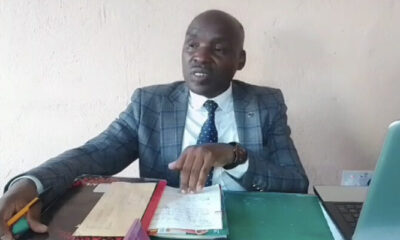

Luapula businessman, Munsanje, reflects on media freedoms and freedom of expression
As stakeholder engagement intensifies regarding the ongoing project to amplify voices on media freedom, freedom of expression, and digital rights,...
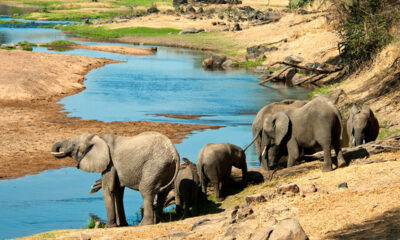

World Bank stops tourism fund to Tanzania’s Ruaha park. Here’s why
A spokesperson for the World Bank said on Wednesday that the lender had stopped all new payments from a $150...


‘It would be risky to release Binance executive from custody risky’, Nigerian govt says
Nigeria’s anti-corruption agency, the Economic and Financial Crimes Commission (EFCC), believes admitting the detained executive of cryptocurrency firm, Binance Holdings...
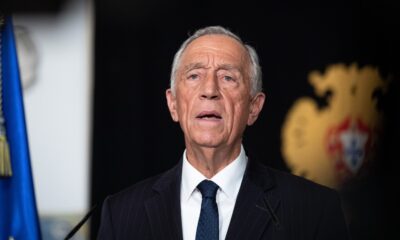

President de Sousa insists Portugal must ‘pay costs’ of slavery, colonial crimes
Following recent conversations around reparations to countries with colonial heritage, Portuguese President, Marcelo Rebelo de Sousa, has added his voice...


Nigeria’s antigraft agency EFCC may try 300 forex racketeers
The Economic and Financial Crimes Commission (EFCC), Nigeria’s anti-corruption body, could go after 300 forex criminals who trade on a...
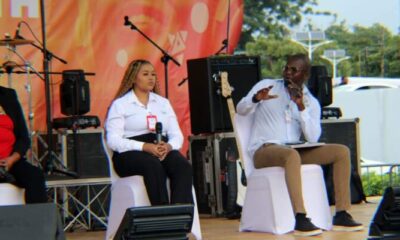

Institute calls for responsible social media usage among youths
Smart Zambia Institute has reiterated the importance of youths to use social media responsibly. Senior Business Applications Officer at the...
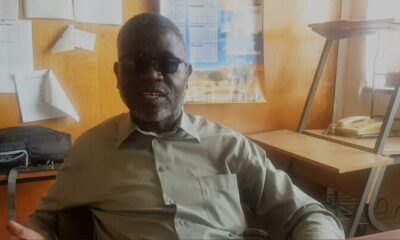

Digital Rights: Policy enthusiast, Jere, advocates self-regulation as alternative to govt regulations
Copperbelt businessman and mining policy advocate, George Jere, has highlighted the importance of self-regulation in the expanding digital media landscape,...
Trending
-

 Musings From Abroad20 hours ago
Musings From Abroad20 hours agoPresident de Sousa insists Portugal must ‘pay costs’ of slavery, colonial crimes
-

 Culture2 days ago
Culture2 days agoEgypt reclaims 3,400-year-old stolen statue of King Ramses II
-

 Metro2 days ago
Metro2 days agoNigerian govt shuts Chinese supermarket over ‘no-Nigerian shopper’ allegation
-
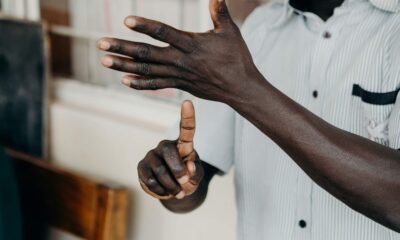
 Metro2 days ago
Metro2 days agoSign language interpreter, Kunda, seeks inclusivity in media rights agenda (video)


